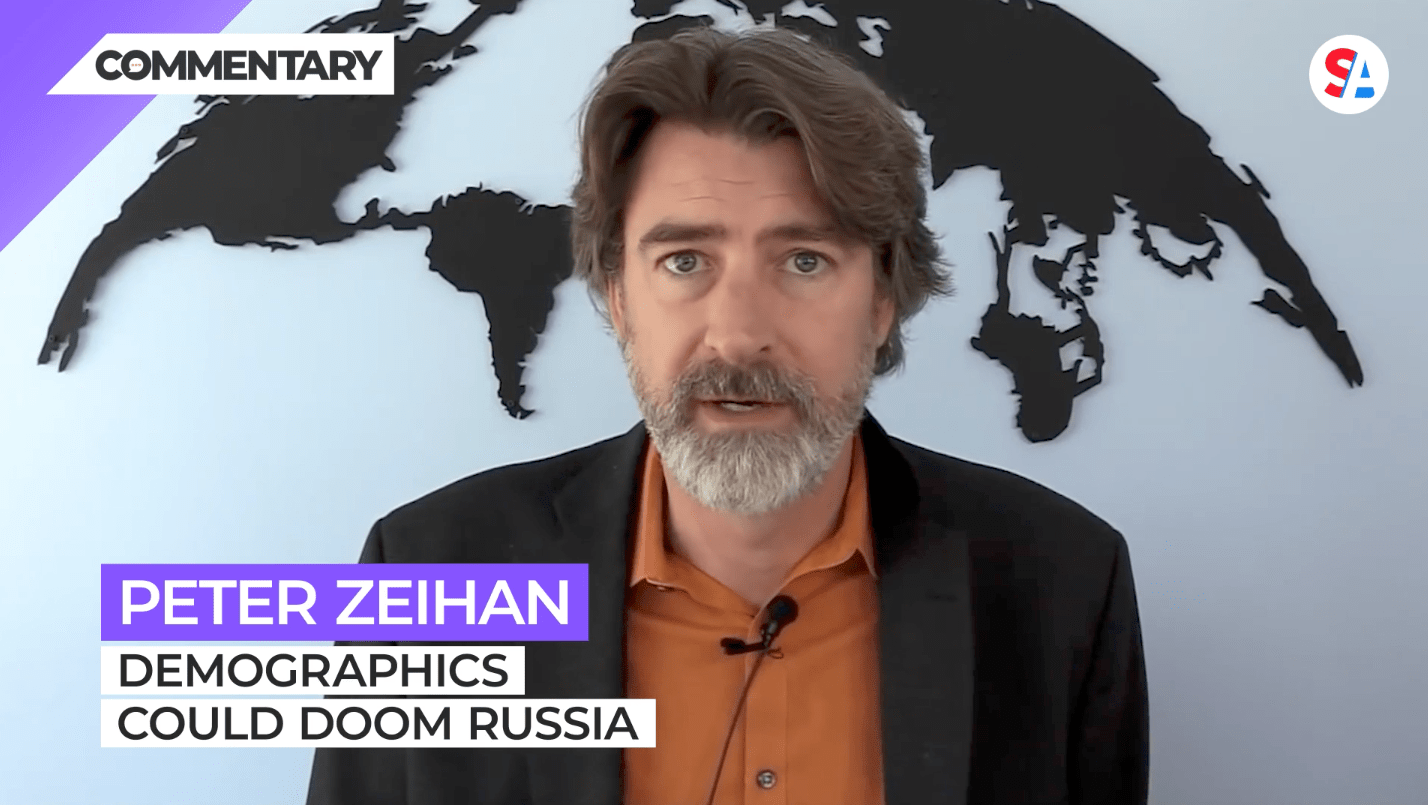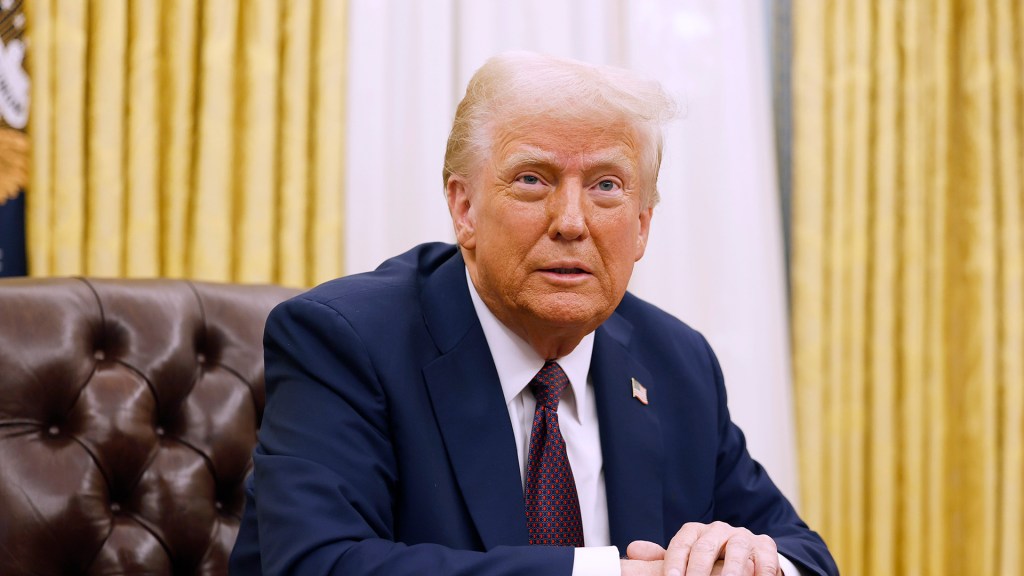
Commentary
-
Our commentary partners will help you reach your own conclusions on complex topics.
Hey everyone. Peter Zeihan here coming to you from Colorado. We are now in the third week of the Ukraine War, and I wanted to discuss a little bit about the limitations that the Russians are facing back at home economically and on the battlefield.
And it all really comes back to the Russian demographic.
The Russian system has faced a number of serious trials and tribulations over the course of the last century. The defeat in World War I gutted a whole generation of young men, which then was insufficient to repopulate in that generation. The following generation was gutted in World War II.
Khrushchev forced everybody into condos, which reduced the birth rate. Brezhnev presided over a decade of stagnation, which reduced the birth rate. And then, ultimately with the Soviet collapse in 1989, we entered a decade period where the birth rate halved and the death rate doubled. That has generated a massive demographic bomb within the Russian system.
And there simply are no longer enough Russians remaining to repopulate the country over the course of the next 30 years. So one way or another Russia is going to vanish as an ethnicity this century.
And one of the major reasons why the Putin government decided that now was the time to launch the invasion of Ukraine is if they didn’t do it now, they were gonna lose the capacity to do it at all.
But there’s more going on here than raw numbers.
A couple things. First of all, the Russian system educationally is a little bit different from how it is here in the United States. So here you go to high school, you go to college, you enter the workforce. In Russia, you go to high school, and after that you get an apprenticeship rather than university training as a rule, and you are an apprentice for five, six years before you then become a skilled craftsman or accountant or whatever it happens to be.
Now, back in the mid 1980s, when the bottom really was falling out of the Russian system, the Russians ceased investing in technical education for everyone. If you were connected to the party you might still be able to get an education, but for most people it just stopped.
It was replaced with ideological indoctrination, which is part of the reason why so many Russians today that who are older, look at what’s going on in Ukraine, and just see it as par for the course, they don’t have an objection to it because they never received kind of the broad spectrum education that you would get in math and economics and engineering and so on.
They were literally raised on the propaganda of the Soviet period. But it also means that the apprenticeship system collapsed, and, overall from roughly 1985 to 1995, the Russian industrial base just stopped. And it’s never really come back.
And so you have a hard cutoff about 1985 for the last time Russians were educated in large numbers. You play that forward at 95, 2005, 2015, and ultimately 2022. And you’re talking about, there’s been a 35-year gap where no one really was educated.
Now this has a number of implications. First, and most importantly, it means that the Russian workforce is one of the least skilled in the world. During the 1990s, when the bottom fell out of the system, over two million Russians immigrated to the west, in order to find greener pastures.
We’re seeing an echo of that now. The people who are able to educate themselves or be hired by foreign companies, and so get some sort of skills, are now in the process of fleeing the country. It’s way too soon to know how many that’s gonna be. But, if by the end of the year, it’s under a half a million people, I would be very surprised.
And these people are utterly irreplaceable because they are the technicians who do all the work that keeps Russia running.
The second problem’s in the military, because the same sort of educational collapse occurred there. So today’s military commanders are nothing like American commanders that go back to school repeatedly through their careers to learn more about history or military technology. And we’re seeing that played out on the battlefield across Ukraine right now.
It’s almost abysmal how badly the Russian military seems to be doing. And it kind of reminds me of the Iraqi military in, the Desert Storm conflict, how it just got wiped out by the American forces. Now, the Russians are playing against somebody who’s even worse than the them, but as you’ve been seen in the news, fatalities, casualties, have been extremely high. Best guess is that three weeks in, the Russians have already lost more troops than the United States did in the entirety of the 20 years that we were in Afghanistan and Iraq.
Finally, leadership.
In the late Soviet period, starting in roughly 1982, the KGB took over the government. Yuri Andropov, Mikhail Gorbachev, Chernenko. These were all KGBers, and they were the only people in the country who really had the full understanding of what was going on. Putin was one of them, which means that there’s a limited cadre to draw from. All of the leadership, all of the political elite within Russia, since the Cold War collapsed, came from the KGB and were educated before 1985, which means that they probably only have about 150 people total that are capable of meaningful political leadership that is even remotely competent.
Compare that to the United States. We have an elite of two to three million people, and there are any number of ways you can get in. You can come in from business like Michael Bloomberg. You can come in from reality television like Donald Trump. You can come in from Hollywood like Ronald Reagan. You could be a governor like Bill Clinton. There’s a number of routes to national leadership, but in Russia, we are talking 150 people. So every time someone gets sick and dies from COVID or slips in the shower and falls on some bullets or ties themselves to a lawn chair and throws themselves in the pool, you are talking about an irreplaceable chunk of talent.
We really are in Russia’s witching hour. The question is what they are able to do with their last gasp, war. Ukraine, step one. Okay. That’s it for me until next time.
-
Hurricane Helene hits US coast, Appalachia and beyond
Hurricane Helene hit Florida and Georgia overnight between Sept. 26 and 27 as a Category 4 hurricane, and accompanying storms will continue reaching deeper into the continental United States today. Dangerous flash flooding from the hurricane, known as storm surge, was some of the worst flooding that the Tampa Bay area has ever seen, and… -
Israel holds upper hand against Lebanon, Hezbollah and Iran
On Wednesday, Sept. 25, Hezbollah launched a ballistic missile at Tel Aviv in retaliation for Israel’s explosive pager attack that blew up devices across Lebanon. Although Israel’s defense systems intercepted the surface-to-surface missile, the attempted strike on Tel Aviv marked a significant escalation by Hezbollah. Since the siege on Gaza began, shortly after the Oct. 7, 2023,… -
The Sinaloa Cartel civil war
Fears of a civil war within the Sinaloa Cartel are growing as violence between competing factions within the cartel continues. The Mexican Army has dispatched around 600 elite troops to Sinaloa to help quell those fears, in addition to roughly 2,200 regular soldiers and National Guard. Watch the above video as Straight Arrow News contributor… -
New Ukrainian weapons hit Russia where it hurts
Ukrainian drones struck a major Russian ammunition depot, triggering a massive explosion that was captured on camera. According to the Ukrainian military, 2,000 tons of munitions had arrived at the depot before the attack. Over the past two years, Ukraine has significantly increased its domestic drone production, allowing it to scale up attacks on military… -
Weighing social costs vs. economic benefits on immigration
Global human migration is one of the defining elements of our current historical era, according to the United Nations. Migrants face both the incentives to leave — forced out by climate change, crime and corruption, extreme poverty or violence — and incentives for where to go, based on available job opportunities and so on. Migration…
Latest Stories
-
 Getty Images
Getty Images
President Trump announces arrest of Kabul airport bombing suspect
-
 Getty Images
Getty Images
Supreme Court requires Trump admin to pay $2B in frozen foreign aid
-
 Getty Images
Getty Images
US State Dept. reestablishes Houthis as ‘foreign terrorist organization’
-
 Getty Images
Getty Images
Reynolds Wrap maker must face lawsuit over ‘Made in USA’ label: Judge
-
 AP Images
AP Images
MLB spring training: Injury concerns for Yanks, other AL teams optimistic
Popular Opinions
-
In addition to the facts, we believe it’s vital to hear perspectives from all sides of the political spectrum.
Latest Opinions
In addition to the facts, we believe it’s vital to hear perspectives from all sides of the political spectrum. We hope these different voices will help you reach your own conclusions.
The opinions published in this section are solely those of the contributors and do not reflect the views of Straight Arrow News.





















Latest Commentary
We know it is important to hear from a diverse range of observers on the complex topics we face and believe our commentary partners will help you reach your own conclusions.
The commentaries published in this section are solely those of the contributors and do not reflect the views of Straight Arrow News.
Dr. Frank Luntz
Pollster and Political Analyst‘Biased’: What Americans think of ‘mainstream media’
‘Getting rid of them’: Americans discuss Trump and immigration
‘Woke’: Why some Biden 2020 voters backed Trump in 2024